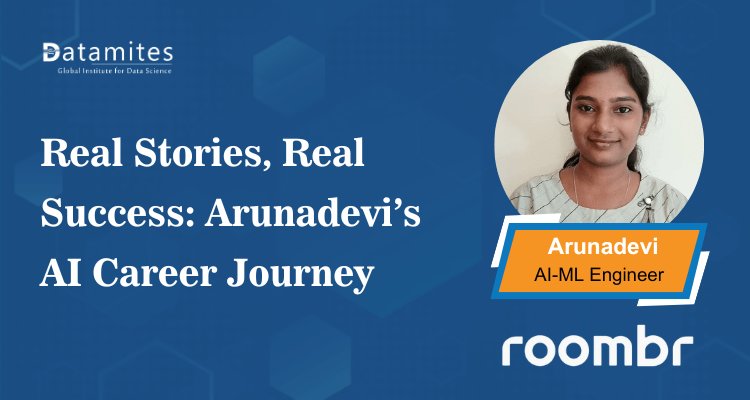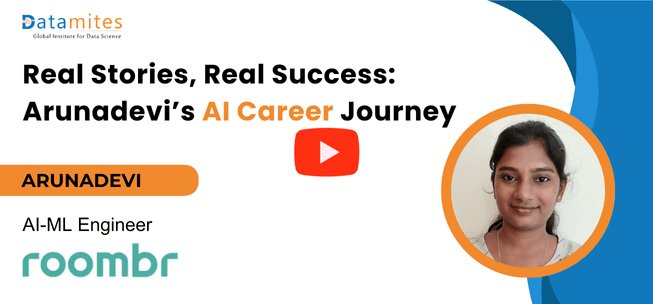Arunadevi’s Path from Math Graduate to AI Engineer
Arunadevi’s Path from Math Graduate to AI Engineer is an inspiring journey of a determined individual who transitioned from a background in mathematics to a thriving career in artificial intelligence. With a strong analytical foundation, Arunadevi leveraged her passion for problem-solving to explore the world of data science and AI.

In a world where data science and machine learning dominate the future of work, Arunadevi carved her path with grit and guidance from the Datamites training program. This blog dives into her inspiring transformation from a mathematics graduate to a confident AI professional highlighting the challenges she faced, the skills she mastered, and the projects that helped her break into the competitive field of artificial intelligence.
Interview Questions, Projects, and Career Advice from a Budding AI Intern
Transitioning into a data science or AI career without a computer science background may seem daunting, but Aruna’s story proves it's possible with determination and the right guidance.
Q1: Can you tell us a little about yourself and your recent career move?
Good afternoon, everyone. I’m Arunadevi from Tamil Nadu. I completed my Master’s in Mathematics in 2022. After that, I enrolled in a data science program to enhance my career opportunities. Now, I’ve successfully landed a position at Roombr as an AI Engineer. I’m very thankful to Datamites for the support I received throughout my journey.
Q2: Did you have any prior experience in computer science or programming?
No, I come from a pure mathematics background. I didn’t have any coding knowledge when I began. It was all new to me. But since I had a strong base in statistics, transitioning into data science was a little smoother.
Q3: How did you begin learning to code?
Initially, I had no idea about coding, but I started learning Python. Thankfully, it’s a beginner-friendly language. For me, it became easier with practice. I began by learning the basics and then practiced coding daily to improve my skills.
Q4: What was your experience like with machine learning?
At first, it was a bit overwhelming. But slowly, as I understood the core concepts like supervised learning and neural networks, it became fascinating. Currently, my role focuses more on AI than traditional ML, so I’m learning a lot about generative AI as well.
Q5: Why did you choose to pursue a career in Data Science?
I chose this field to enhance my skills and because I’m interested in working in an IT team. Data Science provides the right blend of analytical thinking and technical work that aligns with my interests.
Q6: What kind of machine learning project did you work on during your training?
I worked on a sales improvement project using classification techniques in machine learning. We focused on applying algorithms to improve model performance and gain actionable insights for increasing sales. However, I did not work on any forecasting in this project.
Q7: How important are ML algorithms like boosting and random forest in interviews?
In my interviews, a lot of emphasis was placed on ensemble techniques like boosting and random forest. Interviewers asked me to explain these algorithms in the context of the projects I had completed.
Q8: Were you asked about neural networks or deep learning?
Yes, I was asked about neural networks. While I didn’t have hands-on experience, I was familiar with the basic concepts. My training included an introduction to deep learning models like CNN (Convolutional Neural Networks) which helped me understand the foundational ideas.
Q9: How did your previous experience contribute to your transition into data science?
If you’re transitioning from a different field, showcasing your previous experience can be an advantage especially if you present it well in interviews. What matters is how you align your past roles with your current data science skills and use project-based experience to validate your knowledge.
Q10: What role did hands-on projects play in your learning journey?
The projects played a huge role in getting interview-ready. I completed four to five capstone projects during my training, which helped build a solid foundation. These included classification, regression, clustering, and sales effectiveness. I also had the opportunity to work on a client project, which gave me exposure to industry-level work and feedback.
Q11: How valuable was the internship phase in your program?
Internships are a critical part of programs like Danamice. They help learners get real-world experience with 4–5 projects and even live client exposure. This phase prepares students to handle transition interviews more effectively.
Q12: Can you describe your experience with sales forecasting or predictive modeling?
Yes, I worked on a project involving sales effectiveness, which included predictive modeling. It helped me understand how data can be used to forecast trends and support business decisions.
Q13: What types of questions were asked during your interviews?
Most interviewers asked about machine learning basics, Python programming, and the algorithms I used in my projects. One of the main algorithms discussed was ensemble methods like Bagging and Boosting.
Q14: What would be your advice to aspiring data scientists or AI engineers?
Don’t hesitate if you’re from a non-technical background. Just be consistent in learning. Start with basics like Python and statistics, and then move on to machine learning and AI concepts. A structured artificial intelligence course can really streamline your learning journey.
Refer these below articles:
- From Non-Tech to Tech: Sowmiya’s Path to AI-ML Engineer
- Turning Passion into Profession: Nikhil Maurya’s NLP Career Path
- How Bhavya Made a Successful Leap into Artificial Intelligence
Key Findings from Arunadevi’s Journey into AI Engineering
Arunadevi’s inspiring transition from a mathematics graduate to an AI Engineer highlights the possibilities that exist for individuals from non-technical backgrounds to thrive in the field of data science and artificial intelligence.
- Non-technical Background is Not a Barrier: Aruna transitioned into AI from a pure mathematics background with no prior coding or computer science experience.
- Hands-on Projects Were Crucial: Completing multiple capstone and client projects helped her gain practical experience and become interview-ready.
- Internship Experience Added Value: Internship phase with real-world projects and client exposure significantly enhanced her readiness for the job market.
- Python as an Entry Point: She started learning Python due to its beginner-friendly nature and improved her coding skills through daily practice.
- Initial Struggles with Machine Learning: Machine learning seemed overwhelming at first, but continuous learning helped her grasp complex topics like supervised learning and neural networks.
- Project-Based Learning Stood Out in Interviews: Interviewers focused on the practical application of algorithms, especially ensemble methods like Random Forest, Bagging, and Boosting.
- Real-World Business Understanding: Projects like sales improvement and predictive modeling gave her insights into using data for business decision-making.
Read these below articles:
- What is the demand for Artificial Intelligence in Bhubaneswar?
- How In Demand Are Artificial Intelligence in Kochi
- The Growing Demand for Artificial Intelligence in Dehradun
Arunadevi’s transformation from a mathematics graduate to an AI Engineer is both inspiring and instructive. Her success highlights the power of structured learning, practical experience, and a growth mindset. Whether you're from a technical or non-technical background, if you're considering a career in data science or AI, Aruna’s story is proof that with dedication and the right training, anything is possible.
Artificial Intelligence is rapidly transforming the way industries operate, automating routine tasks, enhancing productivity, and enabling advanced decision-making processes. As businesses and governments increasingly adopt AI in their operations, the demand for skilled AI professionals is growing at an unprecedented pace. According to Grand View Research, the global artificial intelligence industry is projected to reach a staggering revenue of USD 1,811,747.3 million by 2030, signaling vast opportunities for those pursuing careers in this field.
DataMites is a global training institute that specializes in data science, artificial intelligence, machine learning, Python programming, and other emerging technologies. The institute offers a wide range of certification programs designed to cater to beginners, intermediate learners, and experienced professionals. With flexible learning modes including online, offline, and self-learning options DataMites ensures accessibility for students with varying schedules and preferences. As an authorized training partner of IABAC and NASSCOM FutureSkills, DataMites provides internationally recognized certifications that add significant value to professional profiles.
DataMites offers a comprehensive Artificial Intelligence course in Bangalore that is structured to provide both foundational knowledge and practical skills. Ideal for both newcomers and professionals looking to transition into AI roles, the program covers a robust curriculum. It starts with the basics of AI, explaining core concepts and their real-world applications. The course includes intensive training in Python programming, the primary language for AI development. Students also gain a strong grounding in statistics crucial for data analytics and machine learning. Advanced topics such as machine learning, deep learning using TensorFlow and Keras, and neural network modeling are also covered, ensuring a holistic learning experience.
DataMites offers an equally thorough Artificial Intelligence course in Chennai aimed at equipping learners for success in the AI field. To accommodate different learning styles and needs, the course is available in multiple formats: classroom training at centers in Anna Nagar, Guindy, and Perungudi; live online sessions for remote learners; and self-paced pre-recorded modules for those who prefer flexible scheduling.

